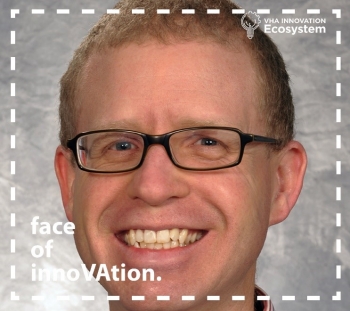Face of InnoVAtion is a regular series from the VHA Innovation Ecosystem (VHA IE) focusing on VA employees who are working to change and save Veteran lives through innovation. This month meet Chris Slatore, MD, MS, Pulmonary & Critical Care Physician. As the Director of Research Education at the Center to Improve Veteran Involvement in Care, Dr. Slatore works within the Department of Medicine at Oregon Health & Science University.
A pulmonary and critical care physician, Dr. Christopher Slatore has a long-standing interest in treatments for lung cancer, the leading cause of death among all lung diseases. Merging his research pursuits with his passion to improve Veterans’ access to high-quality lung cancer screening processes, Dr. Slatore sought out a position at VA. The Veterans Health Administration’s (VHA’s) mission is to serve Veterans and provide them with the best medical care available anywhere, which drew Dr. Slatore in and set him on a path to innovation.
“I felt that working for the VA would give me the best chance to reduce people’s risk of dying from lung cancer.” explained Dr. Slatore.

To help promote lung cancer screening throughout different VA facilities, Dr. Slatore and his team submitted their innovation to the Shark Tank Competition. The innovation provides Veterans with a highly inclusive, safe, and Veteran-centric process that increases access to life-saving annual lung cancer screenings and minimizes the burden for primary care providers.
The VHA Shark Tank Competition identifies employee-developed Promising Practices and matches them with interested facilities. Dr. Slatore and his team’s practice was selected and is now being replicated at the VA Pittsburgh Healthcare System through the Diffusion of Excellence portfolio, which provides project management support and resources to scale a Promising Practice from a single facility to multiple locations.
“We went in thinking we knew everything about lung cancer screening processes and quickly realized that our Implementing Facility Fellows knew a ton as well! They have been very helpful at making our own program even better,” Dr. Slatore said.
Dr. Slatore specifically came to VA because of the opportunity to use world-class medical innovation capabilities to help Veterans. At the facility where Dr. Slatore and his team developed their lung cancer screening practice, they have already positively impacted Veteran lives for the better. Now through the Diffusion of Excellence program, they have the chance to integrate their best practices throughout VHA. The CLCS program so far has received more than 3,500 consults, screened approximately 2,076 Veterans, and detected and treated 62 patients with early-stage lung cancer.
Dr. Slatore’s favorite part about innovation in VA is the collaboration between team members focusing on improving health for Veterans.
“VA is an amazingly innovative place to work! People are given a ton of freedom and encouragement to improve care processes for Veterans. Because of the VHA IE’s singular mission to improve health for Veterans, it is relatively easy to persuade leaders to pursue new strategies and processes that fulfill that mission.” expressed Dr. Slatore.
While it is crucial to urge leaders to help innovate systems, Dr. Slatore added that it is equally important to have a great team, perseverance, and grit to tackle the goal of providing Veterans with expert medical care.
For more information on Dr. Slatore’s work with the CLCS program, click here.
Topics in this story
More Stories
Bob Jesse Award celebrates the achievements of a VA employee and a team or department that exemplifies innovative practices within VA.
The Medical Foster Home program offers Veterans an alternative to nursing homes.
Watch the Under Secretary for Health and a panel of experts discuss VA Health Connect tele-emergency care.






